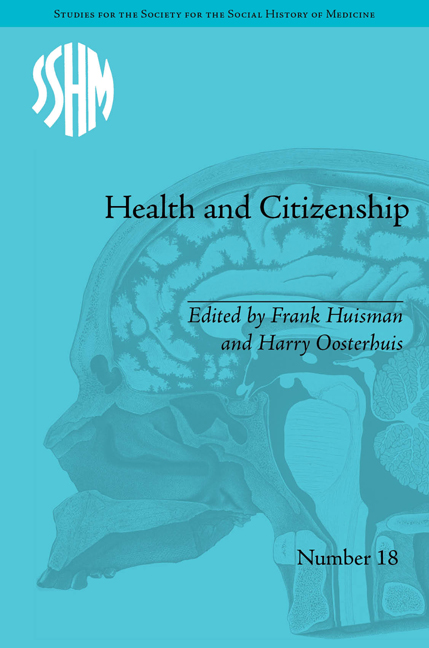Book contents
- Frontmatter
- CONTENTS
- Acknowledgements
- List of Contributors
- The Politics of Health and Citizenship: Historical and Contemporary Perspectives
- Part I Liberal Citizenship and Public Health
- Part II Social Citizenship: Health in the Welfare State
- 5 The Right to Health and Social Citizenship in Germany, 1848–1918
- 6 From Tobacco in the War to the War on Tobacco: Smoking in Britain and Germany from c. 1900 to 1945
- 7 Mental Health and Civic Virtue: Psychiatry, Self-Development and Citizenship in the Netherlands, 1870–2005
- Part III Neo-Republican Citizenship: Health in the Risk Society
- Notes
- Index
5 - The Right to Health and Social Citizenship in Germany, 1848–1918
from Part II - Social Citizenship: Health in the Welfare State
- Frontmatter
- CONTENTS
- Acknowledgements
- List of Contributors
- The Politics of Health and Citizenship: Historical and Contemporary Perspectives
- Part I Liberal Citizenship and Public Health
- Part II Social Citizenship: Health in the Welfare State
- 5 The Right to Health and Social Citizenship in Germany, 1848–1918
- 6 From Tobacco in the War to the War on Tobacco: Smoking in Britain and Germany from c. 1900 to 1945
- 7 Mental Health and Civic Virtue: Psychiatry, Self-Development and Citizenship in the Netherlands, 1870–2005
- Part III Neo-Republican Citizenship: Health in the Risk Society
- Notes
- Index
Summary
Health is both a positive end in itself and the foundation of the entire spectrum of other goods that flow from the ability of healthy individuals to engage in productive labour. And in nineteenth-century Germany the debate over the right to health was part of a much broader debate – one that was simultaneously medical and political – over the causes of ill-health, especially the relation between poverty, work, sickness and personal morality. From the 1848 revolution to the end of the Empire, the vigour with which a right to health was defended was directly related to the extent to which sickness was regarded as a specifically social problem. In the following pages I would like to use the intertwined histories of social medicine and the right to health to make two sets of arguments: one concerning the methodological problems involved in thinking about the relationship between medicine and politics; the other concerning the actual interplay of medicine and politics in the shaping of the German state from 1848 to the founding of the Weimar Republic.
The main point argued here is that, although medical sciences may have evolved according to their respective disciplinary logics, public attitudes towards these sciences and the willingness to translate medical knowledge into public health policy did not depend only – and perhaps not even primarily – on the assumed scientific validity of such knowledge.
- Type
- Chapter
- Information
- Health and CitizenshipPolitical Cultures of Health in Modern Europe, pp. 123 - 140Publisher: Pickering & ChattoFirst published in: 2014



